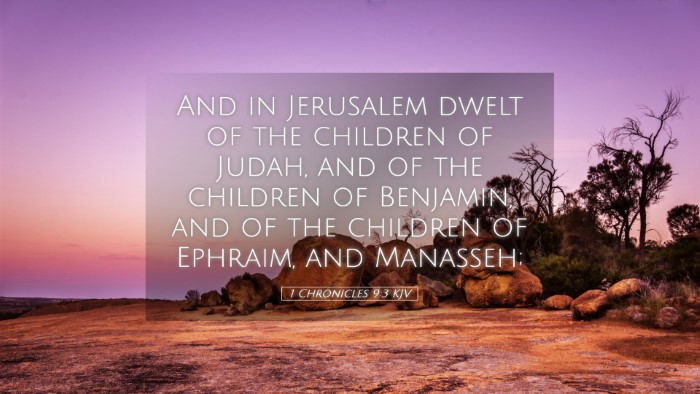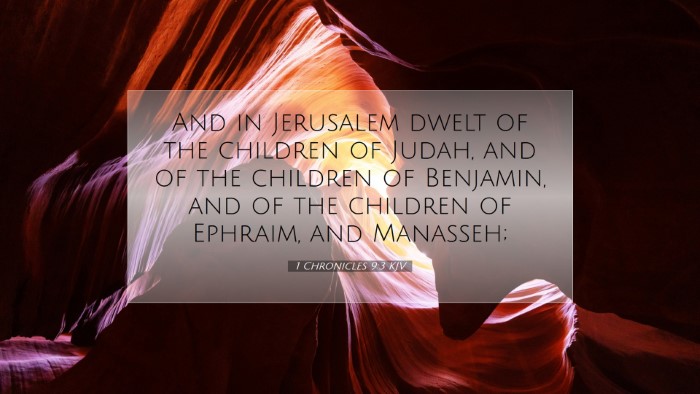Commentary on 1 Chronicles 9:3
Verse: "And the first inhabitants that dwelt in their possessions in their cities were the Israelites, the priests, the Levites, and the Nethinims."
Contextual Background
This verse is set within the genealogical and historical framework of the post-exilic community in Judah. After the Babylonian captivity, many of the Israelites returned to their homeland, particularly focusing on Jerusalem and its surrounding areas. The chronicler details the re-establishment of the community, emphasizing the roles of various groups within Israelite society, including priests, Levites, and Nethinims.
The importance of heritage and identity is underscored in Chronicles, reflecting the concerns of a people who were redefining their national identity after a period of exile.
Theological Insights
This verse reveals the significant role of the clergy and their descendants within the covenant community. Matthew Henry notes that the chronicler emphasizes the importance of returning to the land, bringing to light the spiritual legacy embedded within the families of priests and Levites.
Albert Barnes highlights that the mention of the Nethinims, who were temple servants, reflects the organization of worship in a restored community. Their inclusion serves as a reminder of the diverse roles that contribute to the life of the Israelites in their devotion to God.
Historical Commentary
Adam Clarke provides a historical context for the designation of Nethinims, suggesting these were individuals who had been dedicated to service in the temple, possibly during the time of earlier administrations. Their presence indicates a continuity of service and dedication to the temple rituals that were vital for the spiritual life of the nation.
Clarke also emphasizes the importance of these records, as they serve to validate community claims to the land and their roles within it, reinforcing the notion that worship, service, and communal responsibilities were intertwined in the life of post-exilic Jewish society.
Scholarly Reflections
For pastors and theologians, 1 Chronicles 9:3 serves as a reminder of the foundational role of spiritual leadership in community rebuilding after crisis. It speaks to the necessity of having organized leadership, highlighting that the restoration of the worship life is a priority in rebuilding communities.
- Praise for Leadership: The acknowledgment of priests and Levites underscores the respect due to spiritual leaders as essential facilitators of worship.
- Service Reflection: The Nethinims serve as a reminder that all roles in the church are vital, regardless of their prominence in traditional structures.
- Identity Restoration: The listing of these groups emphasizes the restoration of identity and function within a community.
Application for Today's Church
This verse can challenge modern congregations to reflect on their own memberships and leadership structures. How well are we recognizing and incorporating the different roles within our church communities? Are we valuing every contribution to the life of the church, just as the chronicler valued each group returning to Jerusalem?
Pastors can take away the principle that the restoration and reinvigoration of the church are multi-faceted endeavors that necessitate collaborative efforts from all members. The emphasis on both priests and Nethinims exemplifies the importance of an engaged laity alongside recognized leadership.
Conclusion
In summary, 1 Chronicles 9:3 opens a window into the community's structure during a pivotal moment of restoration. The verse integrates themes of heritage, leadership, and collective responsibility, echoing through generations as a challenge to modern ecclesiastical structures. For anyone engaging with the text—be it scholars, students, or lay leaders—the call remains clear: every role in the life of the community is essential in the eyes of God.


